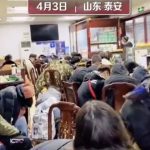五一假期国人多数选择周边短途游(附景点预约指南)
Chinese seen staying close to home for first major holiday since coronavirus
五一假期即将来临,你安排好出游行程了吗?根据旅游运营商的数据,今年五一期间,国人多数选择短途游,旅游业呈现出复苏迹象。
A worker holds a board warning visitors not to gather in groups at the Summer Palace in Beijing, March 22, 2020. [Photo by Zou Hong/chinadaily.com.cn]
China’s tourists are set to stick close to home and take advantage of discounts as they take time off for the first major holiday since the easing of coronavirus lockdowns, offering a glimpse of what travel may look like after the epidemic.
中国游客准备利用新冠疫情防控措施缓解后的第一个长假,进行短途旅游,并好好利用各种折扣优惠。这让人们能够一瞥疫情后中国旅游业的状况。
A five-day Labour Day holiday from May 1 is being seen as a test for the tourism industry, one of the sectors hardest hit by the coronavirus.
旅游业是受新冠疫情打击最严重的行业之一。从5月1日开始的五天劳动节假期,被视为对中国旅游业的一次测试。
Travel operator Trip.com estimates about 90 million people will go on holiday for the May Day break, less than half the number who went last year.
据旅游运营商Trip.com估计,约9000万中国人将利用五一长假出行,人数不到去年的一半。
But hotels and major travel operators said they were optimistic about presale figures, with Marriott International saying many companies were promoting “staycations”.
但酒店和几家大的旅游运营商均表示对预售数字很乐观。万豪国际集团表示,许多公司都在推广“宅度假”。
“It’s encouraging to see signs of recovery after a long, cold winter,” said Jolyon Bulley, chief executive of InterContinental Hotels Group Greater China, who told Reuters May Day bookings were showing some positive signs.
洲际酒店集团大中华区首席执行官乔利恩·布利说:“在漫长的寒冬后看到复苏的迹象,这令人鼓舞。”他告诉路透社,五一假期的预订数字显示出一些积极迹象。
Many people were planning to visit places in home provinces or nearby cities, Trip.com said, citing ticket sales.
Trip.com援引票务销售情况说,很多人计划在所在省份或邻近城市游览。
Half of its presold rooms were for five-star hotels, indicating travellers were seeking better quality accommodation due to epidemic concerns, it said.
已预订房间中有半数为五星级酒店,这显示出游客出于对疫情的担忧,想寻求更优质的住宿条件。
They are also taking advantage of cheap domestic flights and hotel deals being offered by airlines and hotel chains eager to get people travelling again.
游客也在利用航空公司和连锁酒店推出的低价国内航班和酒店住宿,航空公司和连锁酒店热切希望人们恢复出行。
Prices for popular routes such as Beijing to Sanya have been slashed by up to 90%, with booking on average 30% down, according to Alibaba Group’s travel booking platform Fliggy.
根据阿里巴巴旗下的旅游预定平台“飞猪”的数据,北京至三亚等热门路线的机票价格降幅多达90%,而预定量平均下降了30%。
In the financial hub of Shanghai, Marriott is offering guests a 2,202 yuan package that includes a one-night stay at its upscale W Hotel, a cocktail and tapas dinner and spa treatments.
在金融中心上海,万豪酒店为客人提供价值2202元的套餐,包括高档酒店W Hotel住宿一晚、包含鸡尾酒和餐前小吃的晚餐、以及水疗服务。
Jiang Qin, a 38-year-old Beijing office worker, said she was going away but not too far. She aimed to take her 2-year-old daughter to the nearby city of Tianjin, having scrapped a plan to go to Hainan because of Beijing’s quarantine requirements.
38岁的北京上班族蒋琴(音)说,她会选择短途出行。她打算带两岁的女儿去附近的天津市。由于北京的防疫要求,她已经放弃了去海南的旅游计划。
“Tianjin is not the best alternative, but I just want to travel. Anywhere is better than nowhere,” she said.
“天津不是最好的选择,但我只想出去旅行。不管去哪儿都比哪儿都不去好。”
However, industry executives warn that it’s too soon to say how robust the recovery in holiday travel will be given concern about a second wave of the coronavirus.
但业内高管警告称,考虑到出现第二波新冠疫情的风险,现在讨论假日旅游复苏前景如何为时尚早。
International travel remains out of the question for most, due to border restrictions imposed by other countries, a lack of flights and two weeks of quarantine that await people coming back to China.
对大多数人来说,由于其他国家实施了入境限制,出国旅行仍然不可能。出国航班已经减少,并且回国后还要隔离两周。
Major tourism sites and some restaurants have and been told to limit occupancy to as low as 30% of normal levels, capping any recovery.
各大旅游景点和一些餐厅已被告知,要将空间占用率限制在正常水平的30%,这也限制了旅游业和餐饮业的复苏。
The China Tourist Attractions Association estimates that destinations will see an 80% drop in revenue in the first quarter.
中国旅游景点协会估计,今年一季度旅游目的地的收入将下降80%。
“The uncertainties are not completely gone, and no one would be able to tell exactly what will happen,” said Bulley.
“不确定因素没有完全消失,没有人能够明确知道会发生什么,”布利说。
“Recovery will continue to come in phases in China, and what we can do is to be fully prepared under the new norm.”
“中国将继续分阶段恢复日常,我们能做的就是在新常态下做好充分准备。”





-150x150.jpg)

